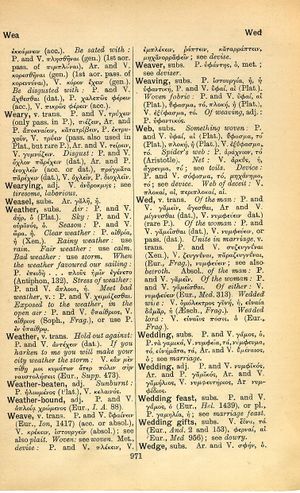wed: Difference between revisions
From LSJ
ἀγαπήσεις τὸν πλησίον σου ὡς σεαυτόν → love your neighbor as yourself, thou shalt love thy neighbour as thyself, love thy neighbour as thyself
(CSV5) |
m (Text replacement - "<b class="b2">Frag.</b>" to "''Frag.''") |
||
| Line 6: | Line 6: | ||
<b class="b2">Of the woman</b>: P. and V. γαμεῖσθαι (dat.), V. νυμφεύειν, or. pass. (dat.). | <b class="b2">Of the woman</b>: P. and V. γαμεῖσθαι (dat.), V. νυμφεύειν, or. pass. (dat.). | ||
<b class="b2">Unite in marriage</b>, v. trans. P. and V. συζευγνύναι (Xen.), V. ζευγνύναι, παραζευγνύναι, (Eur., | <b class="b2">Unite in marriage</b>, v. trans. P. and V. συζευγνύναι (Xen.), V. ζευγνύναι, παραζευγνύναι, (Eur., ''Frag.''), νυμφεύειν; see also [[betroth]]. | ||
Absol., <b class="b2">of the man</b>: P. and V. γαμεῖν. | Absol., <b class="b2">of the man</b>: P. and V. γαμεῖν. | ||
| Line 14: | Line 14: | ||
<b class="b2">Of either</b>: V. νυμφεύειν (Eur., ''Med.'' 313). | <b class="b2">Of either</b>: V. νυμφεύειν (Eur., ''Med.'' 313). | ||
<b class="b2">Wedded wife</b>: V. [[ὁμόλεκτρος]] [[γυνή]], ἡ, εὐναία δάμαρ, ἡ (Aesch., | <b class="b2">Wedded wife</b>: V. [[ὁμόλεκτρος]] [[γυνή]], ἡ, εὐναία δάμαρ, ἡ (Aesch., ''Frag.''). | ||
<b class="b2">Wedded lord</b>: V. [[εὐναῖος]] [[πόσις]], ὁ (Eur., <b class="b2">Frag</b>). | <b class="b2">Wedded lord</b>: V. [[εὐναῖος]] [[πόσις]], ὁ (Eur., <b class="b2">Frag</b>). | ||
}} | }} | ||
Revision as of 11:02, 7 August 2017
English > Greek (Woodhouse)
v. trans.
Of the man: P. and V. γαμεῖν, ἄγεσθαι, Ar. and V. μίγνυσθαι (dat.), V. νυμφεύειν dat.) (rare P.).
Of the woman: P. and V. γαμεῖσθαι (dat.), V. νυμφεύειν, or. pass. (dat.).
Unite in marriage, v. trans. P. and V. συζευγνύναι (Xen.), V. ζευγνύναι, παραζευγνύναι, (Eur., Frag.), νυμφεύειν; see also betroth.
Absol., of the man: P. and V. γαμεῖν.
Of the woman: P. and V. γαμεῖσθαι.
Of either: V. νυμφεύειν (Eur., Med. 313).
Wedded wife: V. ὁμόλεκτρος γυνή, ἡ, εὐναία δάμαρ, ἡ (Aesch., Frag.).

